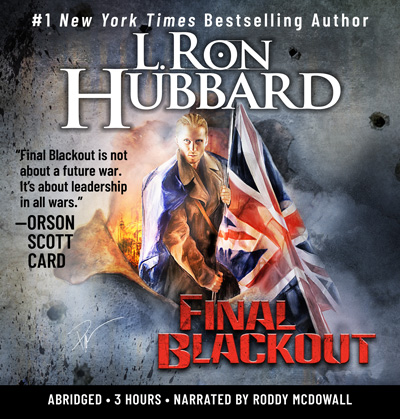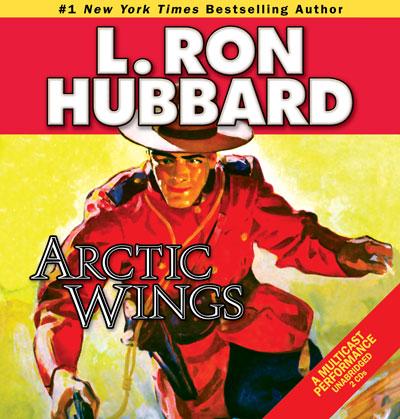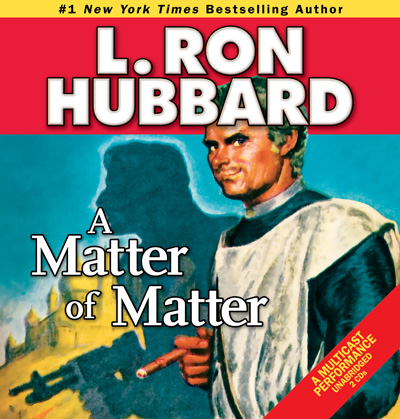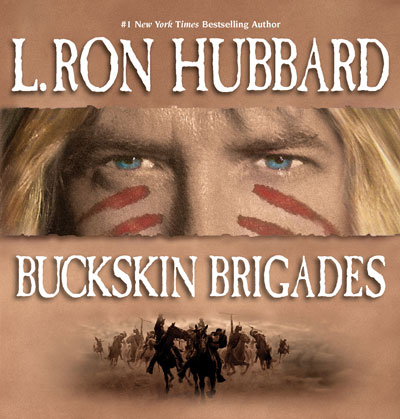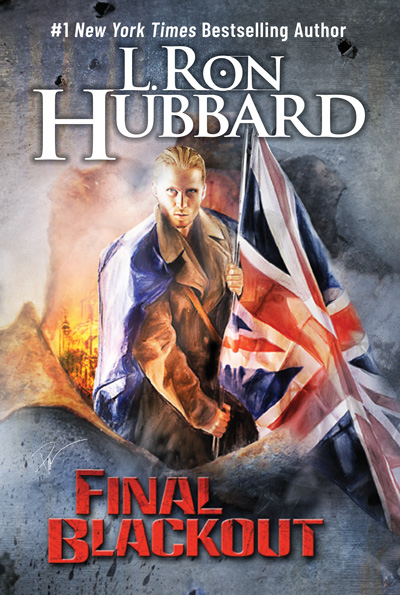The Lieutenant
He was born in an air-raid shelter—and his first wail was drowned by the shriek of bombs, the thunder of falling walls and the coughing chatter of machine guns raking the sky.
He was taught in a countryside where A was for Anti-aircraft and V was for Victory. He knew that Vickers Wellington bombers had flown nonstop clear to China. But nobody thought to tell him about a man who had sailed a carrack as far in the opposite direction—a chap called Columbus.
War-shattered officers had taught him the arts of battle on the relief maps of Rugby. Limping sergeants had made him expert with rifle and pistol, light and heavy artillery. And although he could not conjugate a single Latin verb, he was graduated as wholly educated at fourteen and commissioned the same year.
His father was killed on the mole at Kiel. His uncle rode aflamer in at Hamburg. His mother, long ago, had died of grief and starvation in the wreckage which had been London.
When he was eighteen he had been sent to the front as a subaltern. At twenty-three he was commanding a brigade.
In short, his career was not unlike that of any other highborn English lad born after the beginning of that conflict which is sometimes known as the War of Books—or the War of Creeds, or the War Which Ended War or World Wars II, III, IV and V. Like any other, with the exception that he lived through it.
There is little accounting for the reason he lived so long, and, having lived, moved up to take the spotlight on the Continental stage for a few seconds out of time. But there is never any accounting for such things.
When officers and men, sick with the hell of it, walked out to find a bullet that would end an unlivable life, he shrugged and carried on. When his messmates went screaming mad from illness and revulsion, he gave them that for which they begged, sheathed his pistol and took over the fragments of their commands. When outfits mutinied and shot their officers in the back, he squared his own and, faced front, carried on.
He had seen ninety-three thousand replacements come into his division before he had been a year on the Continent. And he had seen almost as many files voided over again.
He was a soldier and his trade was death, and he had seen too much to be greatly impressed with anything. Outwardly he was much like half a million others of his rank; inwardly there was a difference. He had found out, while commanding ack-acks in England, that nerves are more deadly than bullets, and so he had early denied the existence of his own, substituting a careless cheerfulness which went strangely with the somber gloom that overhung the graveyard of Europe. If he had nerves, he kept them to himself. And what battles he fought within himself to keep them down must forever go unsung.
Before he had been a year on the Continent, the dread soldier’s sickness—that very learned and scientific result of bacteriological warfare, the climax of years of mutating germs unto final, incurable diseases—had caused a quarantine to be placed on all English troops serving across the Channel, just as America, nine years before, had completely stopped all communication across the Atlantic, shortly after her abortive atom war had boomeranged. Hence, he had not been able to return to England.
If he longed for his own land, shell-blasted though it might be, he never showed it. Impassively he had listened each time to the tidings of seven separate revolutions which had begun with the assassination of the king, a crime which had been succeeded by every known kind of political buffoonery culminating in Communism (for at least that is what they called this ideology, though Marx would have disowned it. And the late, unlamented Stalin would have gibbered incoherently at the heresy of its tenets). And he saw only mirth in the fact that, whereas the crimson banner flew now over London, the imperial standard of the czar now whipped in the Russian breeze.
Seven separate governments, each attacked and made to carry on the war. Nine governments in Germany in only eighteen years. He had let the ribbons and insignia issued him drop into the mud, wishing with all his kind that all governments would collapse together and put an end to this. But that had never happened. The fall of one side netted attack from the organized other. And turnabout. Just as the problem of manufacture had unequalized the periods of bombing, so had it served to prolong this war that the brief orgy of atomics, murderously wild, if utterly indecisive, had spread such hatreds that the lingering sparks of decency and forbearance seemed to have vanished from the world. War, as in days of old, had become a thing of hate and loot, for how else was a machine-tooled country to get machines and tools which it could no longer generate within itself?
He knew nothing about these international politics—or at least pretended that he did not. He was, however, in close touch with the effects, for such a collapse was always followed by the general advance of the other side. The fall of his own immediate clique in command meant that he, as a soldier, would be attacked; the banishing of the enemies’ chiefs caused him to attack in turn. But war, to him, was the only actuality, for rarely had he known of that thing of which men spoke dreamily and to which they gave the name “peace.”
He had seen, in his lifetime, the peak and oblivion of flight, the perfection and extinction of artillery, the birth and death of nuclear physics, the end product of bacteriology, but only the oblivion, extinction and death of culture.
It had been three years since he had heard an airplane throbbing overhead. As a child, to him they had been as common as birds, if a shade more deadly. They had flown fast and far, and then when the crash of atom bombs in guided missiles had finally blotted out three quarters of the manufacturing centers of the world, they had flown no more. For the airplane is a fragile thing which cannot exist without replacement parts, without complex fuels, without a thousand aids. Even the assembly of a thousand partly damaged ships into perhaps fifty that would fly did not give a nation more than a few months’ superiority in the air. It was quiet, very quiet. The planes had gone.
Once great guns had rumbled along definite lines. But big guns had needed artfully manufactured shells, and when the centers of manufacture had become too disorganized to produce such a complex thing as a shell, firing had gradually sputtered out, jerkily reviving, but fainter each time, until it ceased. For the guns themselves had worn out. And when infantry tactics came to take the place of the warfare of fortresses and tanks, those few guns which remained had, one by one, been abandoned, perforce, and left in ruins to a rapidly advancing enemy. This was particularly true of the smaller field guns which had hung on feebly to the last.
It had been four years since he had received his last orders by radio, for there were no longer parts for replacement. And though it was rumored that GHQ of the BEF had radio communication with England, no one could truly tell. It had been seven years since a new uniform had been issued, three years or more since a rank had been made for an officer.
His world was a shambles of broken townships and defiled fields, an immense cemetery where thirty million soldiers and three hundred million civilians had been wrenched loose from life. And though the death which had shrieked out of the skies would howl no more, there was no need. Its work was done.
Food supplies had diminished to a vanishing point when a power, rumored to have been Russia, had spread plant insects over Europe. Starvation had done its best to surpass the death lists of battle. And, as an ally, another thing had come.
The disease known as soldier’s sickness had wiped a clammy hand across the slate of Europe, taking ten times as many as the fighting of the war itself. Death crept silently over the wastes of grass-grown shell holes and gutted cities, slipping bony fingers into the cogs of what organization had survived. From the Mediterranean to the Baltic, no wheel turned; for the illness was not one disease germ grossly mutated into a killer which defied penicillin, sulfa, pantomycin and stereo-rays, it was at least nine illnesses, each one superior to yellow fever or the bubonic plague. The nine had combined amongst themselves to create an infinite variety of manifestations. In far countries, South America, South Africa, Scandinavia, where smoke might have belched from busy chimneys, nearly annihilated nations which had never been combatants had closed their ports and turned to wooden sticks for plows. Their libraries might still bulge with know-how, but who could go there to read them? Nations entirely innocent of any single belligerent move in this war, or these many wars, had become, capitals and hamlets alike, weed-grown and tumbled ruins to be quarantined a half a century or more from even their own people.
But the Lieutenant was not unhappy about it. He had no comparisons. When lack of credit and metal and workmen had decreed the abandonment of the last factory, he had received the tidings in the light that artillery had never accomplished anything in tactics, anyway, Napoleon to the contrary. When the last rattling wreck of a plane had become a rusting pile of charred metal, he had smiled his relief. What had planes done but attack objectives they could not hold?
From the records which remain of him, it is difficult to get an accurate description of the man himself, as difficult as it is easy to obtain minute accounts of his victories and defeats. His enemies represent him as having an upsetting and even ghoulish way of smiling, an expression of cheerfulness which never left him even when he meted death personally. But enemies have a way of distorting those they fear, and the oft-repeated statement that he took no pleasure in anything but death is probably false.
Such a view seems to be belied by the fact that he took no pleasure in a victory unless it was bloodless so far as his own troops were concerned. This may be accounted as a natural revulsion toward the school of warfare which measured the greatness of a victory in terms of its largeness of casualty lists. Incredible as it may seem, even at the time of his birth, the mass of humanity paid no attention to strategic conquests if they were not attended by many thousands of deaths. But men, alas, had long since ceased to be cheap, and the field officer or staff officer that still held them so, generally died of a quiet night with a bayonet in his ribs. And so the question may be argued on both sides. He might or might not be credited with mercy on the score that he conserved his men.
Physically, he seems to have been a little over medium height, blue gray of eye and blond. Too, he was probably very handsome, though we only touch upon his conquests in another field. The one picture of him is a rather bad thing, done by a soldier of his command after his death with possibly more enthusiasm than accuracy.
He may have had nerves so high-strung that he was half mad in times of stress—and not unlikely, for he was intelligent. He might have educated himself completely out of nerves. As for England herself, he might have loved her passionately and have done those things he did all for her. And, again, it might have been a coldblooded problem in strategy which it amused him to solve.
These things, just as his name, are not known. He was the Lieutenant. But whether he was madman and sadist or gentleman and patriot—this must be solved by another.
Final Blackout Book Glossary
ack-ack: an antiaircraft gun or a soldier who operates one.
adjutant: a staff officer who serves as military assistant to a more senior officer and is responsible for seeing rules are kept among the lower ranks.
ague: a fever with alternating periods of chills and sweating.
alcohol (machine) gun: See Belgian alcohol (machine) gun.
appetite over dixie: into a state of complete destruction or chaos. This informal expression is one of many variants which probably came from a somewhat more offensive version ass over head. Various words have been used in this expression to make it less offensive or more humorous (for example appetite rather than ass, probably because they start with the same letter). This expression was used literally by riverboat men on the Missouri to refer to someone who had fallen so as to end up upside down. A dixie is a metal cup, plate or pot used by the British during World War I and II.
Army List: a list of officers who serve or have served in the British army.
auto-da-fé: an execution of a heretic by the Spanish Inquisition, especially by burning them at the stake. Auto-da-fé is Portuguese for “act of faith.”
balmy: crazy; insane; extremely foolish.
batman: in the British armed forces, a soldier assigned to an officer as a servant.
Battle of Britain: a historic air battle that took place in the summer of 1940 as part of World War II. In all, 2,936 British pilots defended Britain against the Germans, whose objective was to destroy the Royal Air Force Fighter Command in order to cross the English Channel and invade Great Britain. After just four months the fight was abandoned by the Germans because of the dedication, courage and tenacity of the British.
BCP: British Communist Party.
BEF: British Expeditionary Force; British army forces stationed outside Great Britain. It was created in 1908 to ensure that British forces would be trained and ready to respond quickly. The British army forces were sent to northern France at the start of World Wars I and II to support the French armies.
Belgian alcohol (machine) gun: a fictitious version of a Belgian M249, a fully automatic machine gun that fires a continuous stream of bullets that are fed into it from a long clip. It has a cooling apparatus using air, and is gas operated.
billeting: lodging for soldiers, especially a civilian’s house.
Blinker Towers: a lighthouse that sends messages to ships and to other towers in Morse code using flashing lights. From here, the military can monitor and direct the movement of ships and handle messages from shore between armed forces personnel.
blockhouse: a small defensive building made of stone, brick or very heavy timbers.
brigand: a criminal who steals from people, especially with violence; a bandit.
bubonic plague: a bacterial infection carried by small rodents, such as rats, mice and squirrels, and spread by fleas living on these animals. The bubonic plague caused an epidemic referred to as the Black Death that killed millions of Europeans in the fourteenth through the seventeenth centuries.
Bulge: Battle of the Bulge (16 December 1944–25 January 1945), a battle in which German forces attacked Allied lines with the intention to cut off and annihilate the US and British armies. However, the only result was a large bulge (a military position which projects into the position of the enemy) in the Allied lines. The German advance was halted and cut off by the Allies, and this failure led to the final collapse and defeat of Hitler’s armies.
cabalistic: about secret or mystical beliefs.
caisson: a horse-drawn vehicle with wheels, used to carry artillery ammunition.
carrack: a three- or four-masted sailing ship that Europeans used for trade and exploration of the world from the fourteenth to the seventeenth century.
Carroll: Lewis Carroll (1832–1898), an English author whose most famous writings are Alice’s Adventures in Wonderland and Through the Looking-Glass.
Cepheus: a northern constellation (group of stars) named after King Cepheus in Greek mythology.
chalk hills: hills made of chalk, a soft, whitish variety of limestone.
Cicero: Marcus Tullius Cicero (106–43 BC), a Roman statesman, lawyer, political theorist and philosopher.
cockleshell: a small flimsy boat, so called because it resembles the shell of a cockle (a small rounded sea creature in a shell).
demicannon: a large sixteenth century cannon that fires a ball weighing 30–36 pounds.
dixie: a metal cup, plate or pot used by the army. See also appetite over dixie.
dog robber: someone who carries out various duties for a superior officer.
Dumas: Alexandre Dumas (1802–1870), a French writer best known for his swashbuckling historical tales including The Count of Monte Cristo and The Three Musketeers.
Dunkirk: a port in the northernmost part of France where, during World War II, more than 300,000 British and Allied forces, cutoff by the Germans, were evacuated to England by naval vessels and hundreds of civilian boats. The evacuation came to be called the “Miracle of Dunkirk.”
Duriron: the trademark name of a cast-iron alloy, named for the fact that it is the most durable iron material made with a high resistance to corrosion.
fagged out: very tired.
Father Thames: the River Thames, sometimes affectionately portrayed as a bearded man who protected the original settlements built on its banks.
fieldpiece: a mounted gun; a mobile cannon.
flamer: an aircraft that has been shot down in flames.
gas-mask container: a cylindrical tin container with a lid, designed to carry a soldier’s gas mask (a mask worn for protection against poisonous gas).
GHQ: General Headquarters; military headquarters from which a military commander directs the course of operations and organizes the forces under his command.
Gibbon: Edward Gibbon (1737–1794), an English historian best known for his work The History of the Decline and Fall of the Roman Empire.
gig: a light boat often reserved for the use of a ship’s captain.
girandole: a wall-mounted light fixture consisting of one or two candle holders branching from a main stem in front of a mirror.
Gladstone: short for Gladstone bag; a large traveling case made of stiff leather that opens at the top to reveal two vertical compartments of equal size. The bag was named after William Ewart Gladstone, a former Prime Minister of the United Kingdom.
gunwale: the upper edge of the side of a ship or boat. Originally a gunwale was a platform where guns were mounted, and was designed to accommodate the additional weight and stress of the guns being used.
half-tide lock: See Richmond.
“Hands Across the Sea”: a military march composed in 1899 by John Philip Sousa (1854–1932), dedicated to the US allied countries across the Atlantic.
haversack: a soldier’s canvas single-strapped bag, used to carry food and other supplies when on a march.
hill: See over the hill or slid over the hill.
hobnails: short nails with a thick head used to protect the soles of heavy boots.
Homer: (eighth century BC), a Greek epic poet who is believed to be the author of two of the greatest works in Western literature, The Iliad and The Odyssey.
hulled: pierced in the hull (the main body of a ship), especially below the waterline.
impressed: forced into military service.
Ingraham, Colonel: Colonel Prentiss Ingraham (1843–1904), a prolific American fiction author, best known for his Buffalo Bill series.
Iwo: the Battle of Iwo Jima (19 February–25 March 1945); a battle in which the US Marine Corps fought the Imperial Japanese Army in one of the fiercest and bloodiest battles of the Pacific War of World War II.
jibed: 1. sailed in a particular direction by moving the sails from one side of the vessel to the other. 2. was in harmony or agreement with someone or something.
Khayyám: Omar Khayyám (1048–1131), Persian mathematician, astronomer and poet. His most well-known poetry is the collection translated by English writer Edward FitzGerald entitled The Rubáiyát of Omar Khayyám.
lead: a lead weight suspended on a line, used to determine the depth of water.
leadsman: on ships, the man who uses a lead line, a line marked at intervals of fathoms (six feet) and weighted with lead at one end, to determine the depth of water.
leftenant: a British pronunciation of lieutenant.
lighter: a large, open, flat-bottomed vessel, used in loading and unloading ships offshore or in transporting goods for short distances in shallow waters.
Little Bear: the English translation of the Latin Ursa Minor, a constellation (group of stars) in the northern sky.
lock: See Richmond.
London special: a dense fog in London caused by a large quantity of pollutants, mainly from coal fires, that mixed with heavy mist.
Machiavellian: cunning, deceitful and dishonest. The word Machiavellian comes from the name of the Renaissance diplomat and writer Niccolò Machiavelli (1469–1527) who described how to acquire and maintain political power in his work, The Prince.
Maginot line: a French line of defense named after André Maginot, French Minister of War. It was constructed along the border with Germany during the 1930s and included 22 large underground fortresses, 36 small fortresses, bunkers and rail lines. Despite its strength and elaborate design, it was a failure, as the invading German troops avoided these defenses by entering France via Belgium in May 1940.
make: to increase in depth or volume; to rise as tide.
mole: a sea wall formed of large stones, that extends into the sea and protects ships in a harbor from the force of the waves. There is such a wall at Kiel, a port in northern Germany, that was Germany’s main naval base during World War I.
mortar: a trench mortar; a type of cannon used for firing shells at high angles and short range.
mosquito boat: a small, fast military gunboat used to carry and launch torpedoes.
Nagasaki: a harbor city located on the third largest island of Japan that, in World War II, became the second city to be atom-bombed by the US forces after Hiroshima.
one-pounder: a gun that fires a one-pound shot or shells and looks similar to a miniature cannon.
over the hill: See slid over the hill.
Pangloss: a tutor and philosopher in the satire Candide written by Voltaire (French author and philosopher, 1694–1778), who stated that “everything is for the best in this best of all possible worlds.”
pantomycin: an antibiotic that can reduce or stop the growth of bacteria, fungi, etc.
Parisian wit: a sense of humor that always finds something to laugh about, no matter how tragic a circumstance may be.
parole: a promise, especially from a prisoner of war who is granted freedom after promising not to engage in further combat.
PC: Post Command; a military installation where the command personnel are located.
pillbox: a low, enclosed concrete fort, often partially underground, with narrow openings to fire guns through.
pince-nez: a pair of glasses held on the face by a spring that pinches the nose. Pince-nez is French for “pinch the nose.”
pneumatic: a gun that uses compressed air to fire the ammunition.
port: to carry a rifle or other weapon diagonally across the front of the body with the barrel near the left shoulder.
recall flag: a flag that is raised as a signal for all military personnel engaged in duty, of whatever nature, to return at once.
Richmond: a town on the River Thames, to the southwest of London. It is the location of a lock (a structure with gates that open and close to maintain the river water at a particular level) that also incorporates a footbridge. At high tide, the gates are raised and any vessel can pass through. At all other times the gates are closed so that the water level between the Richmond and Teddington lock stays at or above half-tide level.
riprap: a foundation or wall made from rock or other material that has been thrown down in water or on soft ground in order to protect the shoreline against water erosion.
Roman Wall: also known as London Wall; a defensive wall built by the Romans around their port town of Londinium on the River Thames. The wall was maintained until the eighteenth century and sections remain standing in London today.
Royal Terrace Pier: Gravesend Royal Terrace Pier; a pier (a structure on pillars that leads out to the ocean) built in 1844 that was used by the steamers from London and later became a base for river pilots.
Saipan: the Battle of Saipan (15 June 1944–9 July 1944); a battle of World War II fought on the island of Saipan in the Pacific Ocean. Once taken, Saipan served as an important US air base until the end of the war.
Sandhurst: Royal Military College Sandhurst; the place where all officers in the British army are trained.
set of the water: the direction in which the current is flowing.
Shakespeare: William Shakespeare (1564–1616), English playwright and poet. His works include Hamlet, Romeo and Juliet, Othello, and other plays and poetry.
six-pounder: a gun that fires a six-pound artillery shell.
skiff: a small flat-bottomed rowboat that can also be propelled by sail or motor.
slid over the hill: deserted from the army or gone absent without leave.
sloped: deserted or left without warning.
subaltern: a junior officer in the British military; a commissioned military officer below the rank of a captain.
Swift: Jonathan Swift (1667–1745), an Anglo-Irish satirist, essayist and poet, whose works include Gulliver’s Travels.
Tennyson: Alfred Tennyson (1809–1892), a British poet whose poems include “The Charge of the Light Brigade” and “The Lady of Shalott.”
thermite: a mixture of aluminum powder and iron that burns at a very high temperature. It is used in bombs with a casing of magnesium, a metal which burns at a high temperature when ignited by thermite, and is designed to set buildings on fire with the intense heat.
three-pounder: a gun that fires a three-pound artillery shell.
throw dirt: be disrespectful toward someone or something.
Tommy: a British soldier. The name originated from Thomas Atkins, a name used in example army forms and paperwork.
Tommy-come-afters: British soldiers who have recently arrived in the field. The phrase is a humorous variation of Johnny-come-lately, someone who is new to a place or activity, especially when they are successful or confident of success.
Tower of London: a historic fortress and castle in London on the River Thames. Construction began in 1078 after the Norman Conquest of England. It was later extended and used as a palace and state prison. At the center of the fortress is the White Tower defended by a massive wall flanked by thirteen towers. A second surrounding wall with six towers faces the River Thames.
town-buster: an eleven-ton bomb, also called the Grand Slam, developed by the British at the end of World War II. The bomb buries itself deep in the ground and produces a series of explosions that can destroy a small town.
trip: a device as a switch for activating a mechanism.
truck: a swiveling frame with two or more pairs of wheels, supporting each end of a railroad car.
Union Jack: the national flag of the United Kingdom of England, Scotland and Northern Ireland.
V2: a German missile called Vergeltungswaffe 2 (Vengeance 2). Used against London in 1944, it traveled much like a rocket ship—flying nearly straight up, reaching the border of space, then falling nearly straight down at speeds faster than sound. There was no way to stop such a missile or detect its approach.
Verne: Jules Verne (1828–1905), a French author who pioneered the science fiction genre writing novels such as A Journey to the Centre of the Earth and Twenty Thousand Leagues Under the Sea.
Vickers Wellington bomber: a twin-engine plane used by the British Royal Air Force to drop bombs in World War II. It was capable of flying with heavy battle damage and was the first long-range bomber to be used in the Far East.
warm: short for British warm; a British army officer’s long, thick overcoat made for withstanding the battlefield cold.
warped: moved into a desired place or position by pulling on a rope that has been fastened to something fixed.
whatnot stand: a stand with shelves, used for displaying ornaments, etc.
White Russian: a Russian who fought in support of the tsar against the Bolsheviks (Russian Communist Party) in the Russian Revolution (1917–1918), and against the Red Army during the Russian Civil War (1918–1920).
wore about: turned around by moving the ships’ bows (front ends) away from the wind.
yellow fever: a severe life-threatening disease that is spread to humans by infected mosquitoes in tropical areas of Africa and South America.

